PVTM, a member of Intelnovation Group is driving feed safety forward by offering natural solutions for deactivating pathogens and branching into new business areas.
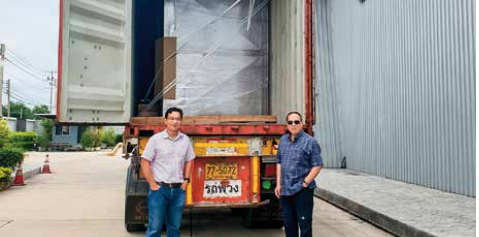
Vasunt Leelayoova, Intelnovation Group’s founder, believes that safe feed is the foundation of healthy and profitable livestock production. With this goal, the company decided to focus on solutions for overcoming feed and raw material contamination.
To keep the business humming, the company has created its own niche in feed safety by developing impressive new products capable of inhibiting mold and pathogenic bacteria in feed and raw materials. At the same time, the company is challenging its customers to change the way they think about feed safety.
Just a couple of decades ago, antimicrobial resistance wasn’t taken seriously and antibiotics were considered omnipotent, silver bullets capable of healing sick animals and driving growth performance. Furthermore, the feed industry saw little need for feed and feedstuffs safety.
It took the industry 20 years to appreciate the importance of feed hygiene, but now consumer expectations of safe food and transparent animal feed supply chains have accelerated demand for clean feed. Also, regulatory authorities nowadays take feed hygiene very seriously.
Clean feed is also fundamental for quality assurance accreditations such as FAMI-QS, HACCP, ISO and GMP.
PVTM’s preservatives and organic acid products are used to deactivate bacteria and enterobacteria. Field applications have found that preservatives also work against Sudasia mite and an early stage of black beetle.
Product development
The company, which started in a garage with a homemade mixer, has grown over the years. Its first big break came after it scaled up production, accumulated test data, and hired a contract manufacturer capable of churning out large volumes.
Gaining permission from customers willing to try out the new products was a major turning point. Commercial scale testing repeatedly confirmed that the company’s proprietary products outperformed competing products. After that, customer confidence grew and orders began to soar.
The first factory in Nonthaburi was quickly built, followed by a second facility at Navanakorn Industrial estate in 2015. Since then, production processes have been re ned to improve the throughput rate and safety. An extension phase scheduled to be operable by the end of 2021 is underway.
Production controls and all automations have been developed internally by Intelnovation software engineers. The software and workflow is designed to enhance quality consistency and traceability. The QC lab, which tests raw materials and finished products, retains samples of finished goods for three years.
Pellet stacking is done by robots. The plant is fully automated with only 10 staff/shift overseeing production. Apart from daily cleaning and maintenance, the engineering team conducts preventive maintenance on a regular basis to thwart glitches that could stall production.
The operations manager ensures that operations and product quality comply with standard operating procedures. Details on the production of each batch are sent to the production manager and relevant staff via mobile phone. Should irregularities crop up, the production manager will be alerted. Data logging is also maintained for compliance audits.
Proactivity
PVTM is doing research in collaboration with universities, research institutes and customers in looking for new solutions to advance the science of feed hygiene.
It keeps a close eye on disruptive technologies that could alter industry practices, for example, functional proteomics and biotechnology as alternatives to current practices for ensuring feed quality.
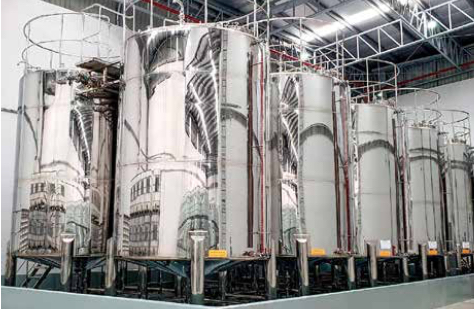
PVTM is also undertaking studies on pest control and looking into the possibility of finding non-chemical solutions to control black beetle which is a vector for pathogenic bacteria and viruses to enter the feed chain.
PVTM’s mold inhibitors and preservatives are available in liquid and dry form for mills that are not equipped with liquid applicators. The company now offers raw material treatment on site.
Small Thai company innovates own technologies
Tanunt Leelayoova, chief operations offcer, said operation control systems, traceability in all aspects, and even the electrical wiring in the plant are implemented internally by Intelnovation’s engineers.
Engineering excellence is one of the company’s key success factors. It has developed a self-calibrating, precision control system for pumps and applicators installed at the feed mills operated by its customers. Moreover, the dispensing units and auxiliary systems are fully insured against unforeseeable events. Customers are free of liability if they do not abuse the system.
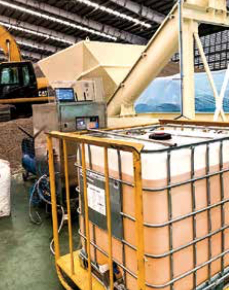
The machines are robust, long-lasting and the dosing is accurate. PVTM’s application systems have been designed to be capable of getting rid of mold in every nook and cranny of mixer and conveyor systems.
“We want customers to be worry-free. Leave the issues of feedstuff hygiene to us,” he said.
Lately it has added an on-line service in response to the Covid-19 pandemic. The self-calibrating system monitors the functioning of spray applicators and pumps and automatically alerts staff if operating discrepancies are detected. The company’s service team is ready at all times to visit customers upon request.
“Online calibration was originally developed to spare our staff from having to work weekends because plants normally do maintenance over the weekend,” said Dr Tanunt.
In case of emergency, PVTM’s mobile service unit can perform feedstuffs cleaning by spraying mold inhibitors and preservatives on site at the loading area, on conveyors at ports, or at customer warehouses if the feedstuffs are found to be contaminated with salmonella or mold beyond what is legally acceptable.
PVTM’s liquid dispensing system is versatile and portable. It can be congured to match site conditions. Customers can track progress of the treatments online. Customers receive reports and expenses in realtime on their mobile phones. Service charges are transparent based on the amount of additives applied.
Carbon efficient
PVTM helps customers reduce their carbon footprint by encouraging them to switch to bulk storage rather than using conventional 1,000-litre IBC tanks. Bulk storage streamlines transportation and reduces packaging waste.
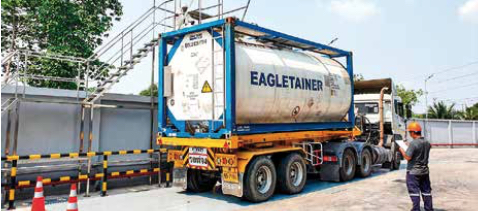
“We believe that reducing our own car- bon footprint and helping customers to reduce greenhouse gas emissions is the way to go,” said Mr Vasunt.
Globally, reducing carbon emissions is shaping up to be the next big trend. The United States targets reducing its GHG by 50-52% from 2005 levels by 2030 and plans to rejoin the Paris climate agreement. The European Union is planning to have a carbon neutral economy by 2050.
Conventional 1,000-litre IBC tanks are being replaced by 22-tonne container tanks because their greater volume offers better carbon efficiency.
The greater need for handling, refilling and cleaning makes IBC tanks costlier. They have to be delivered to the customer’s plant, then picked up and send to a third-party certified cleaner, and then validated before they can be refilled. The IBC tanks are made of polyethylene and only last for five years whilst the 22-ton tanks last longer and are totally recyclable.
Although they offered greater efficiency, the larger tanks were not rapidly adopted when first introduced. To convince customers to switch to the bulk system, the company offers discounted prices. Now, the 22-tonne tanks are the industry’s preferred choice. The farm tank system helps customers reduce greenhouse gas emissions.
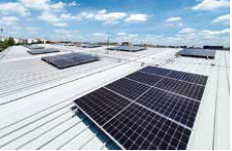
PVTM began life-cycle analysis in 2012 to assess the environmental impact of its products, packaging and logistics to reduce its environmental footprint.
Intelnovation Group’s core value is gratitude to the countries where it operates, and it shows its gratitude by donating to hospitals and universities.
Customers who switch to bulk tanks reduce tonnes of greenhouse gas emission, which is equivalent to taking up a large-scale reforestation project.
PVTM plans to become carbon neutral, Dr Tanunt said. Solar panels on the factory roof are underway. Plant design and work processes are aimed at energy savings using natural air movement to make the workplace comfortable.
PVTM has sustained growth and expanded its footprint to over 10 countries. It is exploring new business opportunities in offering applicators and pumps to customers who need high-precision systems outside of livestock industries.
The company is a good corporate citizen, and is committed to doing business in a way that is legally, ethically and economically responsible.
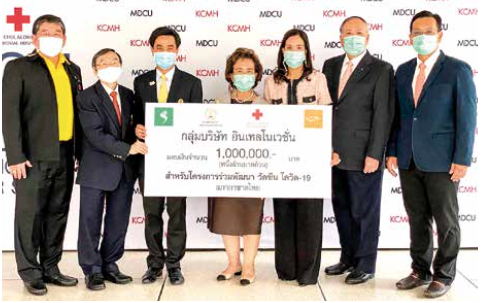
It has supported universities, research institutes and hospitals in Thailand developing new vaccines to prevent Covid-19 and donating medical equipment to ophthalmology departments at various hospitals. Lately, it has donated anti-fog spray produced internally together with face shields to hospitals around the country.
PVTM puts its customers at the forefront, conducts business honestly, and delivers safe products of the highest quality. It treats employees well. Without them, the company could not have progressed this far, he said.
